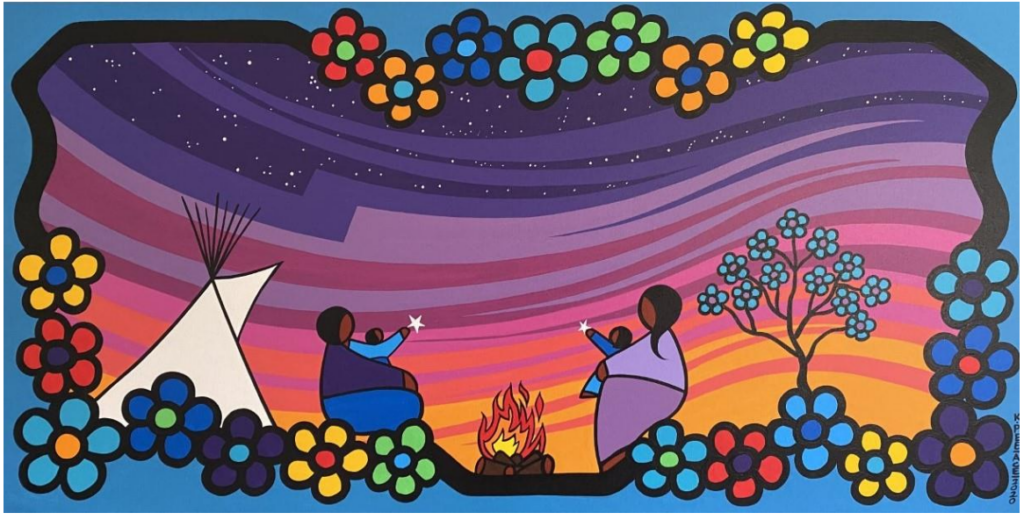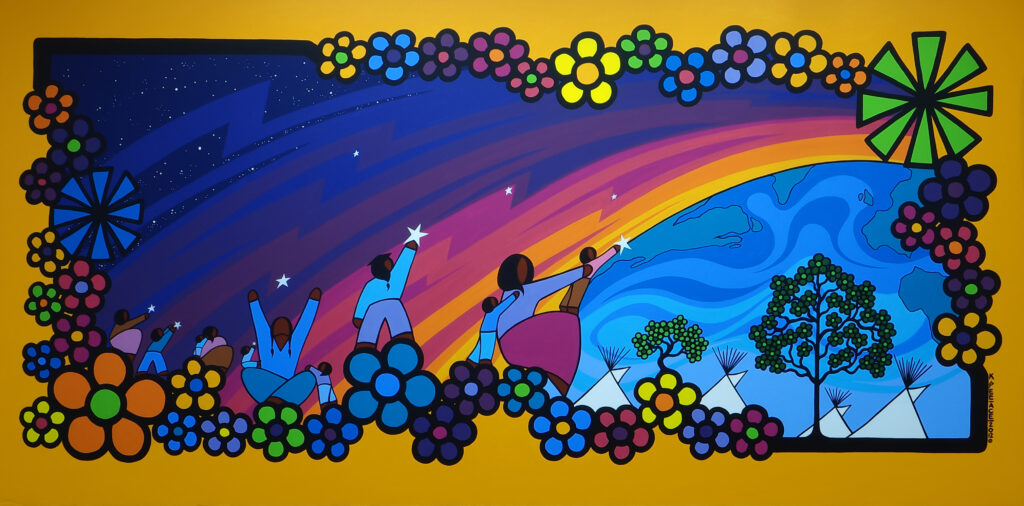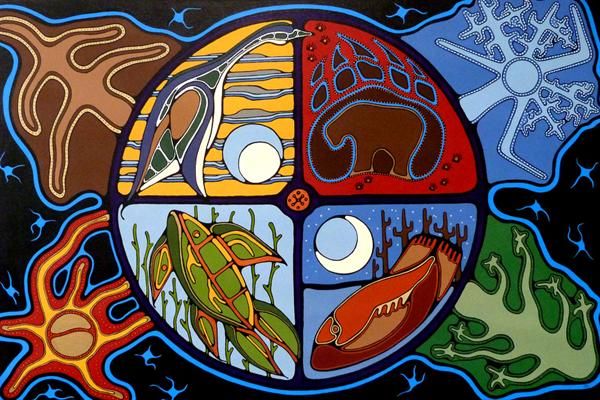
This is not the only theme within Indigenous research, but is the largest overarching theme seen in Indigenous research at this time where Nations are recovering from colonial harms. In order to begin engaging with this research let’s break down what these terms mean.
Decolonization:
Decolonization is about cultural, economic, psychological and individual freedom from colonization. For Indigenous people, this looks like achieving Indigenous Sovereignty, which is the right and ability of Indigenous people to practice self-determination over their land, cultures, languages, and political and economic systems.
As colonization is an on-going global project where settlers continue to occupy land, dictate social, political, spiritual and economic systems and exploit natural resources, decolonization is also a global endeavor.
Decolonization is not a metaphor, and requires physical, hands on work to undo the damages that have been done so that future generations do not have to face the same mistreatment and trauma over their lands, bodies, minds and spiritual selves.
Re-Indigenization:
Authors No’kmaq et al states that:
“Re-Indigenization entails transformations in ways of thinking and knowing that forefront Indigenous worldviews and Natural laws, amplify Indigenous languages and voices, and recognize and embrace Indigenous stories and insights. Core to re-Indigenization is an Indigenous mindset or worldview, informed by relations with the land, which sees all of the “ecologies” as alive, interdependent, and interrelating forms in flux and permeated by spirit (Young 2016). Such a mindset, if more broadly embraced, would go a long way towards setting the stage for the necessary transformative systemic changes grounded in ethics of care and responsibility for both biodiversity and all peoples.”
This concept is very similar to decolonization, only it focuses more directly on increasing the presence of Indigenous peoples, practices and knowledges within traditionally Eurocentric institutions (such as research).
Decolonization & Re-Indigenization in Research Today
Now that we have an understanding of what these terms encompass, let’s take a look directly at the research that is happening within a handful of fields. The research articles below are only examples within the field they are referring to and are not in any way a comprehensive list, but rather are presented to show that decolonization is happening within multiple fields and areas of study and the various ways this looks.
Decolonization of Criminology and Justice Systems

Reflections on Decolonization and X_aaydaG_a Tll Yahda TllG_uhlG_a: a Haida Justice System (2022)
McGuire is a Haida researcher who examines the imposition of colonial governance systems on a self-determined Haida Tll yahda (“making things right”” justice system, and asks how can Haida concepts of justice be implemented today?
This research focuses on building capacity for Tll yahda and establishing Tll yahda and is done through direct interviews with individuals of Haida Nation to determine how to address the roadblock of feelings of helplessness and inferiority that culminate in lack of action. McGuire discusses the necessity of self-determination and nation-based governance that operates according to Haida specific laws, values and cultural protocols in order to reclaim Haida justice.
First Peoples Law: Essays on Canadian Law and Decolonization (2018)
Bruce McIvor is a Métis Lawyer who is a partner at First People’s Law in BC. This publication is a collection of essays that have been written by McIvor discussing Indigenous land title, treaty law, Métis specific legal arrangements, Duty to consult and what decolonization looks like within the legal field. This is a very different approach to research using professional knowledge grounded in experience as a lawyer and historian to advocate for Indigenous rights.
This research is a collaboration between Indigenous and non-Indigenous researchers Murdoch and McGuire which focuses on the results of one criminology course where curriculum was actively re-written to assist in decolonization through strategic usage of Indigenous literature and scholarship.
This study examined how students engaged with being forced to confront implicit and explicit biases, overt and systemic racism all within the field of criminology to ultimately recognize how settler colonialism affects Indigenous people’s involvement in the criminal justice system.
Decolonizing Early Childhood Education

Diaz-Diaz is a Chilean researcher who critiques current attempts at decolonization within the field of Early Childhood Education. Her research discusses how ECE’s are being misled into believing children are learning decolonizing pedagogies, but are instead having the truth of colonial damage obfuscated by a regime focused on invisibility. Diaz-Diaz examines how this can be addressed and how tools of erasure can be studied to create an Indigenized future.
Colonialism in Early Education, Care, and Intervention: A Knowledge Synthesis (2020)
This research is a collaboration between Indigenous and non-Indigenous researchers Underwood, Ineese-Nash and Haché that works to understand the support systems in place for Indigenous families who have a disabled child. Families were interviewed about their experience accessing disability support services for their children within Early childhood education, and discusses how culture is not an explicit focus within intervention settings.
This study discusses the difficulty in assessing Indigenous children’s disabilities due to cultural translation and differences in perspectives regarding trajectory of development, as well as the pathologizing of parents fault in their child’s disability. Underwood, Ineese-Nash and Haché offer solutions in relation to decolonizing these institutions so that families have more appropriate resources within early years.
Decolonizing Environmental Sciences

David-Chavez is a multi-cultural Caribbean Indigenous (Arawak Taíno) research scientist who wrote this PhD Dissertation in attempts to look at current methodologies applied in scientific research while working with Indigenous communities in attempts to determine better ways of relationality. Intergenerational knowledge passed down by those who have carefully observed the dynamics of environmental changes are recognized as a critical resource within this research, and David-Chavez attempts to assure this knowledge is consistently included through the creation of a evidence-based, practitioner-informed analytical framework.
This study focuses on a case study field-testing that’s grounded within this framework, that highlights innovative participatory methods, resources, and lessons learned to inform processes for aligning cultural and academic institutional protocols for research integrity and decolonization.
This collaborative research project between Indigenous and non-Indigenous scholars Wilson, Bell, Arreak, Koonoo, Angnatsiak and Ljubicic states that efforts to date have not advanced Indigenous participation or capacity building in Arctic environmental science. This research aims to assure true decolonizing practices are being embraced within Arctic environmental sciences by a restructuring model called the Sikumiut model, for Inuit and non-Indigenous researchers interested in supporting Inuit self-determination.
This model assures Inuit are governing all aspects of the research and that non-Indigenous research partners are there to assist in training and mentorship of Inuit youth so that they can one day do the research themselves. This research framework embraces Inuit decision making and self-determination in research in ways that are not currently seen.
Addressing unconscious coloniality and decolonizing practice in geoscience (2021)
Klymiuk is a Métis scientific researcher who discusses how Indigenous ways of knowing encompass an understanding of life, land, air and water as components of an integrated system much like geoscience does. This intimate knowledge of the land is important and crucial to have as a central aspect of geoscience knowledge, and within this research they attempt to implement decolonizing actions that discuss the similarities within Indigenous ways of knowing and this field of science.
Decolonizing Education and Teaching

Applying Indigenizing Principles of Decolonizing Methodologies in University Classrooms (2017)
This collaborative research between all Indigenous scholars Louie, Pratt, Hanson and Ottmann focuses examples of ongoing work to Indigenize education programs based on their own practices. Such examples within this research include storytelling as a focus on oral traditions, grade negotiating based on potlatch, physically embodied learning, and celebrating survival through digital storytelling. These are all possibilities for Indigenous pedagogies to be incorporated within educational institutions to change the way certain knowledge sharing practices are seen as legitimate.
This research is a collaboration by Indigenous and non-Indigenous academics Gaudry and Lorenz that attempts to determine what current efforts towards Indigenization by academic institutions looks like. Through survey’s they assert that indigenization is a three-part spectrum. On one end is Indigenous inclusion, in the middle reconciliation indigenization, and on the other end decolonial indigenization.
Gaudry and Lorenz conclude that despite using reconciliatory language, post-secondary institutions in Canada focus predominantly on Indigenous inclusion. They also offer practical suggestions of policy and praxis to assure that these institutions make tangible change.
Decolonizing Social Work

The settler colonialism of social work and the social work of settler colonialism (2018)
Fortier and Hon-Sing Wong work in collaboration to discuss the way in which social work was critical to settler colonialism and how that foundation of this field needs to be reckoned with before movements of decolonization can happen. Some critical ways in which this can be done first start with assuring that social work practices are under the control of the Indigenous communities themselves, as well as working towards the repatriation of Indigenous lands, children, and cultural traditions and the upholding of Indigenous sovereignty.
Decolonizing Education and Educators’ Decolonizing (2019)
Absolon is an Anishinaabe researcher who looks specifically at how future social workers education curriculum and practices can be decolonized in accordance with the TRC’s Calls to Action. Absolon states that decolonizing is a lot like detoxing from all of the toxins we have ingested, and that social work can be a site for transformative education if social workers and educators would stop upholding Eurocentric ideologies of colonization.
Through partnership with the Centre for Indigegogy which was developed in 2017 to deliver professional development training for social work educators who want to decolonize their programs, Absolon examines in group settings whether teachers are engaging with this responsibility.
As mentioned above, there are hundreds more fields in which decolonization is happening and can happen, but the above examples are just a sample to give readers an idea as to what this can look like.
How Can We Engage with Research focusing on Decolonization?
The first step is to determine what research applies to the field you work in. We all have a part to play in unsettling Canada regardless if we are Indigenous or non-Indigenous, and we all can make valuable contributions to assuring Indigenous rights are upheld.
If you are working within research, education, public policy or any field that utilizes research it is crucial that the process for conducting research with Indigenous communities places Indigenous voices and epistemologies in the center of the research process at all stages.
We must be very careful to assure that in attempts to engage with decolonization we are not speaking over Indigenous individuals or communities needs; decolonization is a continuous process of anti-colonial struggle that honors Indigenous approaches to knowing the world, recognizing Indigenous land, Indigenous peoples, and Indigenous sovereignty – including sovereignty over the decolonization process (Datta, 2017).
Global Solidarity Action states that when we are considering the merits of a proposed decolonial action, it’s helpful to examine it in the light of this non-exhaustive list of questions:
- Does the decolonization effort, initiative, or movement involve input and continued representation from Indigenous people?
- Does the effort provide resources to Indigenous people?
- Does the effort replicate colonial relationships and power structures?
- Is the effort a one-time, short-term initiative? If so, is there a plan for new or continued efforts beyond this initial step?
When considering engaging with decolonial research as non-Indigenous individuals it’s always important that we are remaining aware of potential power imbalances, and that we are lending our unique skills to the already established needs of the community rather than trying to lead based on our own assumptions.
Concluding Thoughts:
Now that we all have a general understanding as to what decolonization means within the context of research, let’s take a look at one of the fastest growing and integral focus topics within Indigenous decolonial research today: Language Revitalization.